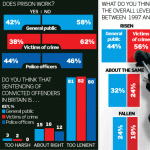Education and Community Sentences
Make Justice Work’ is arguing for greater use of community sentences as a better alternative than short prison sentences. I agree – which is why I’m an ambassador for the campaign, along with many others. But my focus is primarily on custody, because the charity of which I’m director largely works inside prison, so my reason for agreeing is slightly different.
Each year I read thousands of letters from prisoners applying for grants for distance learning courses. It’s very interesting to meet prisoners through their letters – they often explain their lives and their aspirations very openly. Admittedly, those who apply to us are usually the ones who want to change – unlike others who may still be determined on a criminal lifestyle or unable to see past the addictions that have led them to prison. But their letters are still impressive. Many work hard inside prison, pursue education and training with energy and commitment, and take on voluntary and paid roles helping others, often for the first time. They tell us how these experiences have changed their attitudes and confidence, and nourished hope of a different future life.
Genuine rehabilitation is never a quick fix. It takes much more time, and a more varied range of hooks and triggers, than a short sentence can enable. It is inevitably a learning process. What strikes me strongly, reading prisoners’ applications to this Trust, and meeting them on prison visits, is how many individual pathways to self-reform there are. It is impossible to predict which course, or activity, or contact, or programme, will be the key to self-transformation, or when it will happen, but almost certainly it needs time.
Today’s prison regimes, including offending behaviour courses and learning and skills provision, aim to cover all seven rehabilitation pathways, and that’s admirably holistic in intention. But the risk is that rehabilitation becomes a series of tickboxes, rather than an individual and self-chosen process. I believe this is where voluntary organisations and the activities they offer can add much value. One of the most worthwhile events I’ve attended recently was the Prison Reading Groups conference at Roehampton University, where prison facilitators and volunteers from some of the twenty or so prisons where there are reading groups came together to discuss their work.
The range of texts being read and discussed by prisoners was fascinating; from Martina Cole’s thrillers and Noel Smith’s prison memoirs to Shakespeare and Tennyson; reading Aesop’s fables and Mary Oliver’s poetry, along with a wide range of novels. It will, of course, be next to impossible ever to demonstrate exactly what influence such reading might have had in any individual’s rehabilitation journey. But if we value civilisation, and culture, and literature, or even just the power of story, then we must believe that reading groups for prisoners play a part in opening up space for rehabilitation.
Short sentences can never create this space. They are inevitably costly conveyor belts, processing people for virtually no purpose other than a fairly pointless punishment. If society would prefer less crime, and fewer criminals, and lower re-offending costs, then short sentences should, as far as possible, be abandoned.
And why not sentence offenders in the community to reading as well as other activities?







